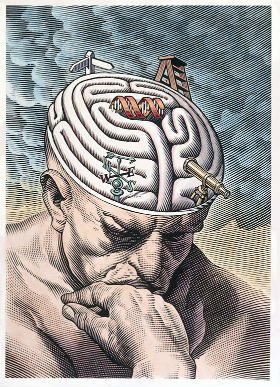When it comes to questions of ethics and morals we are as divided as we can possibly be. There are of course elements that are predictable, variables that can be observed defined or influenced by the environment we grow up in, but with "time and choice" some of the things we consider ethical when young begin to show their different colors.
If you have never thought of this there is a good chance you have not traveled enough and I'm not saying that as an insult, just as an observation. Cultures can be polar opposites and unlike some who tackle this subject, I'm willing to say that some cultures are quite incompatible.
I fully realize my words may sound offensive to some, but they do not imply the lack of tolerance, they are meant to invite honest reflection and acceptance of observable truths. Just a few days ago I read a great post about a tribe with a very unique system of educating their young and I was reminded once again that my own lens, my bias was quite useless to analyze the situation.
For us in the Western World the cultural practices of this particular tribe would be not only cataloged as barbaric, but as the open practice of one of the worse kinds of child torture. I would recommend to you stop by @zyx066's blog and give it a good read, it really gets the mental gears going.
From where we stand, it might be too easy to call them archaic and dismiss them as remnants of a past that will eventually go away. From where they stand we, the westerners are these strange humans who destroy the planet, don't respect nature and act like monsters. The question then becomes...
Today however, I'm of the idea that Morality and Ethics have to left to be evaluated within their field of operation and governance. Meaning that they can only be "judged" if they bring harmony and functionality within their established communities. This is not to say that all aberrant behavior (out of the social norm) can be or should be excused, it simply invites us to evaluate what we perceive as "the norm" with a lens that is not our own.

(signature by @bembelmaniac )
If you have never thought of this there is a good chance you have not traveled enough and I'm not saying that as an insult, just as an observation. Cultures can be polar opposites and unlike some who tackle this subject, I'm willing to say that some cultures are quite incompatible.
I fully realize my words may sound offensive to some, but they do not imply the lack of tolerance, they are meant to invite honest reflection and acceptance of observable truths. Just a few days ago I read a great post about a tribe with a very unique system of educating their young and I was reminded once again that my own lens, my bias was quite useless to analyze the situation.
For us in the Western World the cultural practices of this particular tribe would be not only cataloged as barbaric, but as the open practice of one of the worse kinds of child torture. I would recommend to you stop by @zyx066's blog and give it a good read, it really gets the mental gears going.
The fork in the road
It becomes quite obvious that in their world, our concepts of morality and ethics are as useful as chop sticks for eating jello. It does not mean though that one of us could not attempt to adapt to their culture and be functional within their society or viceversa, it's just very, very unlikely.From where we stand, it might be too easy to call them archaic and dismiss them as remnants of a past that will eventually go away. From where they stand we, the westerners are these strange humans who destroy the planet, don't respect nature and act like monsters. The question then becomes...
Who is right?
The answer is almost comically expected.... "context matters"Is change necessary, is intervention needed?
This is exactly where real conflict makes his power-point presentation. Have we not been here before? I can't think of a single instance where cultural oppression and replacement resulted in a harmonious outcome, but I'm willing to learn and correct my own thoughts on the matter.Today however, I'm of the idea that Morality and Ethics have to left to be evaluated within their field of operation and governance. Meaning that they can only be "judged" if they bring harmony and functionality within their established communities. This is not to say that all aberrant behavior (out of the social norm) can be or should be excused, it simply invites us to evaluate what we perceive as "the norm" with a lens that is not our own.
Why is it important to think about this?
To gain perspective of course, to maybe think about our own concepts of morality and ethics, to think about how much of what we hold as "truth" belongs to us and how much was given, or to be more accurate, how much as strategically incepted. Food for thought as they say.
(signature by @bembelmaniac )

